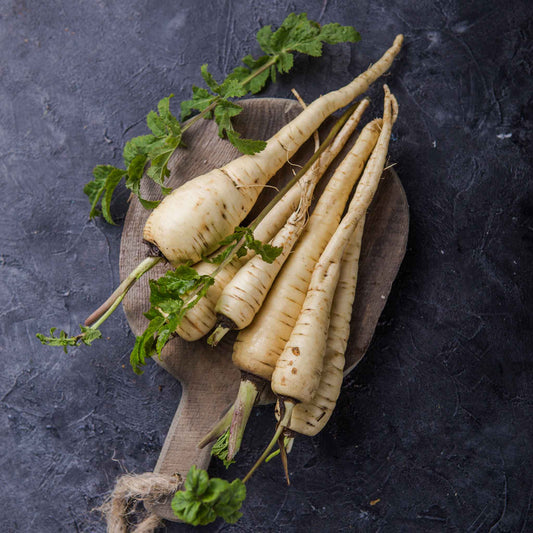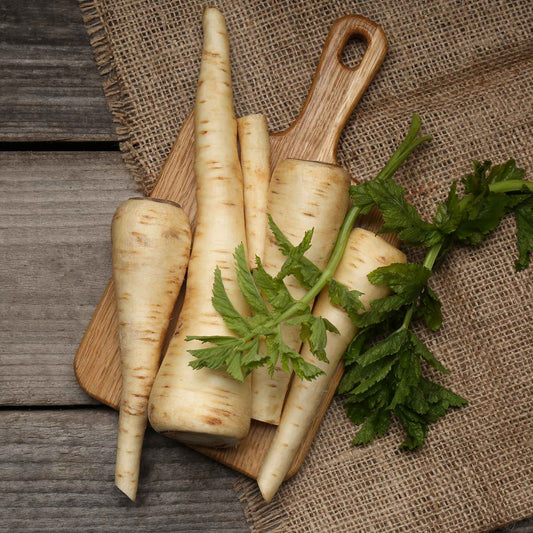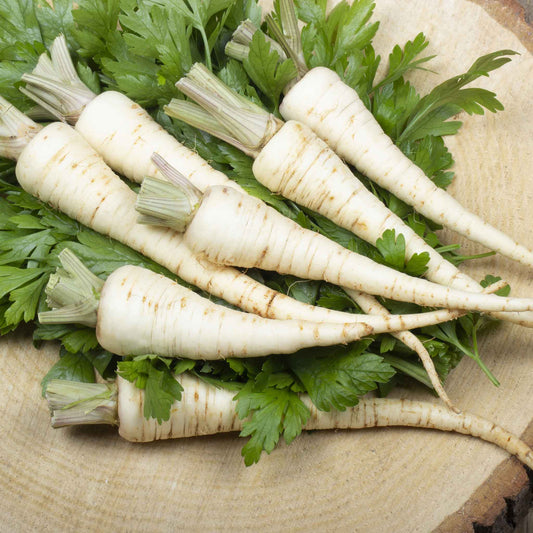-
main-collection-product-grid

Parsnip Seeds - All-American
Sweet and tender, our most popular parsnipParsnip Seeds - All-American
Sweet and tender, our most popular parsnipRegular price As Low As $4.99Regular priceUnit price per -
main-collection-product-grid

Parsnip Seeds - Hollow Crown
Known for its smooth, sweet flavor and excellent storage abilityParsnip Seeds - Hollow Crown
Known for its smooth, sweet flavor and excellent storage abilityRegular price As Low As $4.99Regular priceUnit price per -
main-collection-product-grid

Parsnip Seeds - Harris Model
Long, slim shape with a sweet flavorSaleParsnip Seeds - Harris Model
Long, slim shape with a sweet flavorRegular price As Low As $4.99Regular priceUnit price per$22.99Sale price As Low As $4.99Sale
What's to love about garden parsnips
- Thrives in bright, sunny growing areas
- A cool season vegetable rich in Vitamin C and potassium
- Can be roasted, pan fried, boiled, mashed, eaten raw in salads, and more
- Resemble carrots visually but have a more nutty, earthy flavor
What is a parsnip?
When was the last time you had a parsnip? Have you ever? A close cousin of the carrot and parsley, parsnips don’t get nearly as much attention as their showier relatives but contain just as much nutritional benefit. Parsnips may take all season to mature, but produce a delicious root vegetable that only gets sweeter with each winter frost.
Parsnips are a cool-season root vegetable that, while technically a biennial, can be grown as an annual in most hardiness zones. Most varieties of parsnips need about 100 days to mature, so direct sow parsnip seeds as soon as the ground is workable in your region. Ideally, soil temperature will be at least 46°F. Multi-sow parsnip seeds in rows, in well-amended soil. Thin seedlings to three to five inches apart, and sit back and wait! Harvest parsnips after the first frost for the sweetest roots.
Vegetables to grow with parsnips
Parsnips make great companion plants for a variety of vegetables, including peas, bush beans, peppers, and tomatoes! Parsnip flowers attract predatory insects that eat pests like aphids, and because parsnips grow down and produce thick roots, these plants break up tough soil.
How to prepare parsnips
Parsnips can be prepared any way you’d cook carrots—roasted, boiled, mashed, or even eaten raw! Parsnips are rich in Vitamin C, K, and folate. Parsnips also contain antioxidants that boost immunity and fight chronic illnesses. Picky kids (or adults) at the table? Substitute half the potatoes for parsnips in your next mashed potato batch and just see if anyone notices—and if they do, see if it isn’t a compliment for the chef.
Store parsnips in the ground!
The best thing about parsnips, though? You can store them in the ground. When the rest of your fresh vegetables are eaten or start to go bad, you can just walk outside and pull a few parsnips out of the ground. Parsnips aren’t too bothered by cold or light freezes—frost just makes parsnip roots sweeter. One less vegetable you have to can or freeze! And for a busy gardener like you, that’s a win.
Why not give parsnips a chance this season? Eden Brothers has four heirloom varieties to offer, and none will disappoint.
For more information about planting, growing, and harvesting parsnip seeds, see the Parsnip Seeds Planting Guide.


